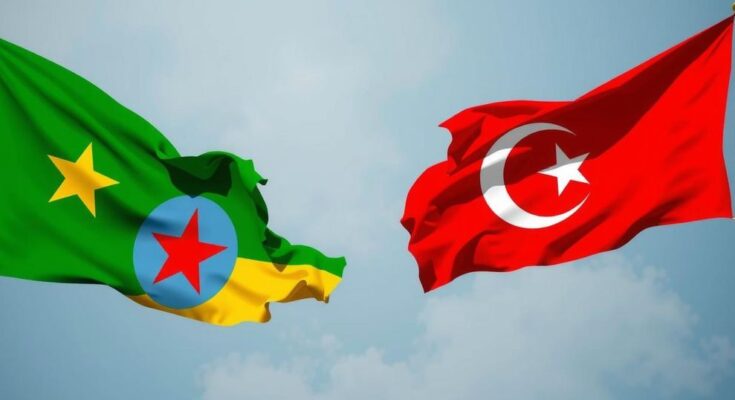Turkey is actively mediating the escalating tensions between Somalia and Ethiopia resulting from a contentious Memorandum of Understanding between Somaliland and Ethiopia. With strong diplomatic ties to both nations, Turkey aims to alleviate disputes and foster peace in the Horn of Africa. However, internal political complexities and the diverging interests of Ethiopia and Somalia pose significant challenges. The Ankara process faces obstacles, particularly regarding issues of sovereignty and geopolitical ambitions, highlighting Turkey’s critical yet challenging role in facilitating dialogue.
Turkey’s diplomatic efforts to mediate between Somalia and Ethiopia represent a critical attempt to alleviate the escalating tensions stemming from the Memorandum of Understanding (MoU) agreed upon by Somaliland and Ethiopia in January 2024. As a nation with established diplomatic relations with both Somalia and Ethiopia, Turkey is perceived as a credible mediator in these discussions. The country has historically prioritized stability and peace in the Horn of Africa by significantly supporting Somalia’s efforts in state-building and enhancing its military capabilities against militant groups like al-Shabab. Simultaneously, Turkey’s military assistance has bolstered the Ethiopian government’s capacity to counter the Tigray People’s Liberation Front (TPLF) during Ethiopia’s recent conflicts. Thus, the negotiations in Ankara aim to ease strains between Somalia and Ethiopia and contribute to regional stability. During a recent set of talks, Foreign Minister Hakan Fidan emphasized Turkey’s diplomatic goals, stating, “As Turkey, our goal is to address the existing concerns and resolve the issues in a way that will benefit not only Somalia and Ethiopia but the entire region.” Despite these goals, the task of resolving the maritime dispute is complicated by the deeply ingrained positions held by both sides regarding national security and state integrity. Furthermore, the geopolitical landscape of the Horn of Africa continues to shift, influenced by various regional interests, as noted by scholar Tunç Demirtaş. The Horn of Africa is susceptible to ongoing conflict and instability, and the Ankara process serves as a critical opportunity for disentangling this conflict for the benefit of the entire region. However, the recent breakdowns in Somalia and Ethiopia, compounded by the contentious Somaliland-Ethiopia MoU, present a formidable challenge for Turkey’s mediation efforts. Since assuming office in 2018, Ethiopian Prime Minister Abiy Ahmed’s ascension was initially seen as a transformative era for both the country and the Horn of Africa; however, this promising moment quickly dissipated. Ethiopia’s myriad ethnic groups often clash over power dynamics, a situation described by scholar Saskia Brechenmacher as “a history of repression” that characterizes Ethiopia’s internal politics. The use of military force often dictates the political landscape. Amid multiple crises, Abiy’s rhetoric of revitalizing Ethiopia echoes imperial ambitions, fostering tensions with neighboring Somalia, Eritrea, and Egypt. As observed by regional commentator Zach Vertin, there are concerns regarding Abiy’s suitability as a leader amid rising criticism. The MoU between Hargeisa and Addis Ababa exacerbates tensions by challenging Somalia’s territorial integrity, with Ethiopia’s pursuit of coastal access and a military base in the strategic Bab el-Mandeb area now posing existential threats to Somalia’s sovereignty. In light of Somalia’s military weaknesses and fragmented politics, Ethiopia capitalized on the situation to execute the MoU with Somaliland, crossing a critical line in diplomatic relations. To effectively mediate the Somalia-Ethiopia conflict, Turkey must adopt a nuanced approach to balance its roles, recognizing that Ethiopia’s sea access has little regard for Somalia’s fraught existence. Any military conflict would jeopardize stability, drawing in regional powers and advocacy groups, further complicating the situation. The United Nations mediation principles provide a framework for such diplomacy, yet Ethiopia’s motivation to establish a military presence at sea conflicts with Somalia’s sovereignty and interests. It is imperative for Ethiopia to pursue commercial maritime access with its neighbors to enhance regional connectivity, rather than attempting to establish a military foothold, which would provoke Somalia. The historical context of Ethiopia’s imperial aspirations adds layers of complexity, making Turkey’s mediation efforts both vital and challenging.
The article explores Turkey’s role in facilitating peace between Somalia and Ethiopia, amidst rising tensions linked to the Memorandum of Understanding (MoU) established between Somaliland and Ethiopia. The situation is compounded by the fragile political climate in the Horn of Africa, defined by military conflict and ethnic strife. Turkey’s historical relations and investments in Somalia’s security underscore its capacity to mediate effectively, while the internal political dynamics within Ethiopia, especially under the leadership of Abiy Ahmed, complicate the negotiation process.
In summary, Turkey’s attempts to mediate the Somali-Ethiopian dispute through the Ankara process are both crucial and impeded by complex geopolitical and legal challenges. The conflicting aims and positions of Ethiopia and Somalia necessitate a delicate balancing act in Turkey’s diplomatic efforts. The prospect of conflict looming over the Horn of Africa calls for a comprehensive approach that addresses both nations’ concerns while promoting regional stability.
Original Source: www.dailysabah.com




